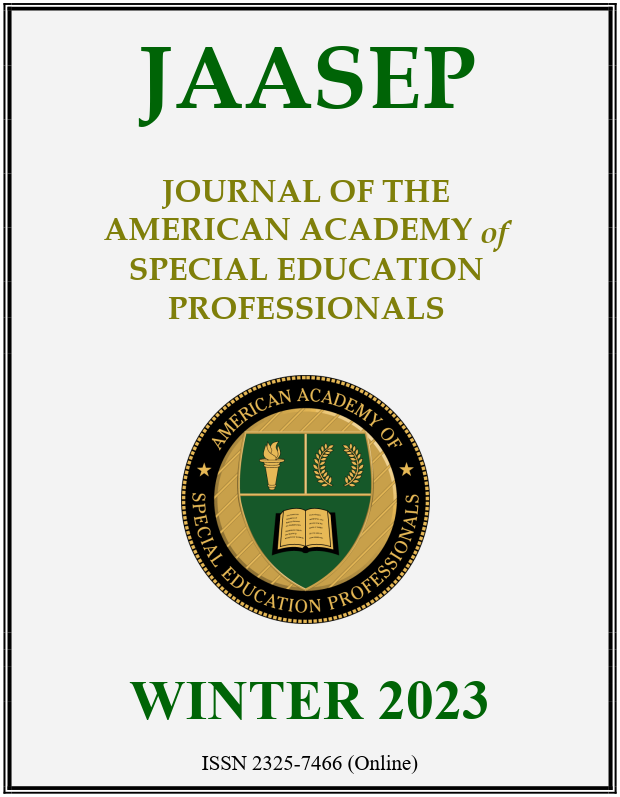Strategies and Challenges to Teaching Students with Special Needs During a Pandemic
Basham, J. D., Blackorby, J., & Marino, M. T. (2020). Opportunity in crisis: The role of universal design for learning in educational redesign. Learning Disabilities: A Contemporary Journal, 18(1), 71-91.
Beck, I. L., McKeown, M. G., & Kucan, L. (2013). Bringing words to life: Robust vocabulary instruction. Guilford Press.
Brantlinger, E., Jimenez, R., Klingner, J., Pugach, M., & Richardson, V. (2005). Qualitative studies in special education. Exceptional Children, 71(2), 195-207. https://doi.org/10.1177/001440290507100205 DOI: https://doi.org/10.1177/001440290507100205
Braun, V., & Clarke, V. (2006). Using thematic analysis in psychology. Qualitative Research in Psychology, 3(2), 77-101. https://doi.org/10.1191/1478088706qp063oa DOI: https://doi.org/10.1191/1478088706qp063oa
Borup, J. (2016). Teacher perceptions of learner-learner engagement at a cyber high school. International Review of Research in Open and Distributed Learning, 17(3), 231-250. https://doi.org/10.19173/irrodl.v17i3.2361 DOI: https://doi.org/10.19173/irrodl.v17i3.2361
Collins, K. M., Green III, P. C., Nelson, S. L., & Madahar, S. (2015). Cyber charter schools and students with dis/abilities: Rebooting the IDEA to address equity, access, and compliance. Equity & Excellence in Education, 48(1), 71-86. https://doi.org/10.1080/10665684.2015.991219 DOI: https://doi.org/10.1080/10665684.2015.991219
Crouse, T., & Rice, M., & Mellard, D. F. (2018). Learning to serve students with disabilities online: Teachers’ perspectives. Journal of Online Learning Research, 4(2), 123-145.
Currie, B. (2020). Special education in the remote learning era. Principal Leadership, 22-23.
Greer, D., Harvey, D., Burdette, P., & Basham, J. (2015). FAPE and LRE in online learning: Special education directors' perspectives. Journal of the American Academy of Special Education Professionals, 53-71. DOI: https://doi.org/10.64546/jaasep.274
Greer, D., Rowland, A. L., & Smith, S. J. (2019). Critical considerations for teaching students with disabilities in online environments. Teaching Exceptional Children, 46(5), 79-91. https://doi.org/10.1177/0040059914528105 DOI: https://doi.org/10.1177/0040059914528105
Hodges, C., Moore, S., Lockee, B., Trust, T., & Bond, A. (2020). The difference between emergency remote teaching and online learning. Educause Review, 27, 1-12.
Individuals with Disabilities Education Act, 20 U.S.C. § 1400 (2004). Jitendra, A. K., Edwards, L. L., Sacks, G., & Jacobson, L. A. (2004). What research says about vocabulary instruction for students with learning disabilities. Exceptional Children, 70(3), 299-322. https://doi.org/10.1177/001440290407000303 DOI: https://doi.org/10.1177/001440290407000303
Marteney, T., Bernadowski, C. (2016). Teachers’ perceptions of the benefits of online instruction for students with special educational needs. British Journal of Special Education, 43(2), 178-194. https://doi.org/10.1111/1467-8578.12129 DOI: https://doi.org/10.1111/1467-8578.12129
McLeskey, J., Mcheady, L., Billingsley, B., Brownell, M., & Lewis, T. (2019). High Leverage Practices for Inclusive Classrooms. Routledge, NY. DOI: https://doi.org/10.4324/9781315176093
Rice, B. (2016). Rethinking technological resources in self-study of teacher education practices: The case of taking and teaching online courses. Being Self-Study Researchers in a Digital World: Future Oriented Research and Pedagogy in Teacher Education, 16, 87-101. https://doi.org/10.1007/978-3-319-39478-7_7 DOI: https://doi.org/10.1007/978-3-319-39478-7_7
Rice, M. F., & Deshler, D. D. (2018). Too many words, too little support: Vocabulary instruction in online earth science courses. International Journal of Web-Based Learning and Teaching Technologies, 13(2), 46-61. https://doi.org/10.4018/IJWLTT.2018040104 DOI: https://doi.org/10.4018/IJWLTT.2018040104
Rice, M., & Dykman, B. (2018). The emerging research base for online learning and students with disabilities. Handbook of Research on K-12 Online and Blended Learning, 189-206.
Samaila, D., Ayanjoke, K. M., Mailafia, I. A., & Joshua, C. E. (2020). Impact of Covid-19 pandemic on people with disabilities and its implications on special education practice in Nigeria. International Journal of Innovative Science and Research Technology, 5(6), 803-808.
Schuck, R. K., & Lambert, R. (2020). “Am I doing enough?” Special educators’ experiences with emergency remote teaching in Spring 2020. Education Sciences, 10(11), 320. https://doi.org/10.3390/educsci10110320 DOI: https://doi.org/10.3390/educsci10110320
Stenhoff, D. M., Pennington, R. C., & Tapp, M. C. (2020). Distance education support for students with autism spectrum disorder and complex needs during COVID-10 and school closures. Rural Special Education Quarterly, 39, 211-219. https://doi.org/10.1177/8756870520959658 DOI: https://doi.org/10.1177/8756870520959658
Straub, C., & Vasquez, E. (2015). Effects of synchronous online writing instruction for students with learning disabilities. Journal of Special Education Technology, 30(4), 213-222. https://doi.org/10.1177/0162643415618929 DOI: https://doi.org/10.1177/0162643415618929
Vasquez, E., & Serianni, B. A. (2012). Research and practice in distance education for K-12 students with disabilities. Rural Special Education Quarterly, 31(4), 33-43. https://doi.org/10.1177/875687051203100406 DOI: https://doi.org/10.1177/875687051203100406
Vasquez, E., & Straub, C. (2012). Online instruction for K-12 special education: A review of the empirical literature. Journal of Special Education Technology, 27(3), 31-40. https://doi.org/10.1177/016264341202700303 DOI: https://doi.org/10.1177/016264341202700303
Weatherly, J., Wolfram, P., & Eckes, S. (2020). Special education and FAPE in the age of COVID-19. Principal Leadership, (21) 1, 62-63.
Xu, W., & Zammit, K. (2020). Applying thematic analysis to education: A hybrid approach to interpreting data in practitioner research. International Journal of Qualitative Methods, 19, 1-9. https://doi.org/10.1177/1609406920918810 DOI: https://doi.org/10.1177/1609406920918810
Downloads
Article Information
- Article Type Articles
- Submitted January 19, 2023
- Published February 15, 2023
- Issue Winter 2023
- Section Articles
